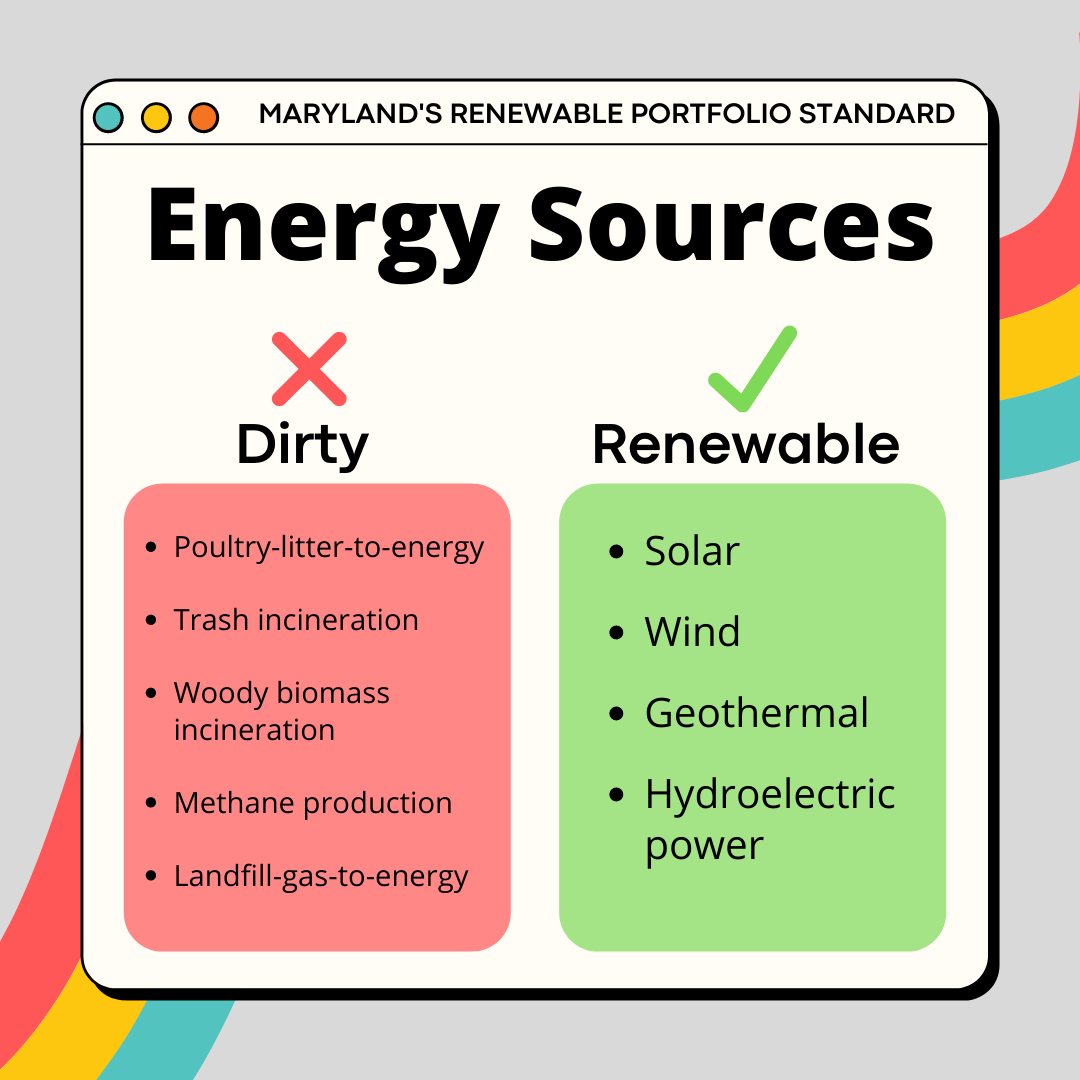
Today, 13 environmental and social justice groups announced the creation of the Reclaim Renewable Energy Coalition (Reclaim REC); formed to clean up Maryland’s Renewable portfolio standard (RPS).
Maryland’s RPS was created by the state legislature in 2004 as a way to ramp up the supply of emission-free electricity on our grid, and reduce the use of polluting fossil fuels. Despite good intentions, the RPS has in fact had little impact on state greenhouse gas emissions reductions, as described in a report from Public Employees for Environmental Responsibility (PEER). Additionally, the report notes, energy from several sources currently counted as renewable emits even higher levels of asthma and cancer causing pollutants than sources of energy already excluded from the RPS, such as natural gas.
For years, Maryland has allowed polluting, carbon-intensive fuel sources like trash incineration and factory farm biogas to qualify for subsidies and credits under the RPS program, undermining the very purpose of the standard. In a report chronicling state RPS, Food & Water Watch gave Maryland an “F” for its system, which allows numerous “dirty” energy sources to count as clean. These subsidies are paid by Maryland households and businesses in the form of utility bill surcharges that should be supporting emission-free energy development.
Delegate Vaughn Stewart (D-Montgomery) has pledged to introduce legislation to eliminate dirty energy sources from the RPS in the 2022 General Assembly session. The coalition is united in the need to ensure Maryland’s RPS supports in the development of clean energy sources, like wind and solar, while cutting out language that allows polluting fuel sources like municipal waste incinerators, biogas digesters, burning wood and more to qualify for support from ratepayers. To announce the new coalition, the groups released a video with coalition demands.
“These giveaways are great for corporate polluters, but terrible for working families in Maryland,” said Delegate Vaughn Stewart (D-Montgomery). “Handouts for dirty energy means fewer clean energy jobs and higher utility bills. It’s way past time to turn off the pollution spigot.”
“For too long, Maryland has allowed corporate polluters to profit off a public health crisis and climate destruction — it’s time for the state to clean up their act,” said Lily Hawkins, Maryland Organizer with Food & Water Watch. “For too long, false solutions like factory farm biogas have proliferated under the guise of “greenwashed” clean energy. The people of Maryland know better and deserve better. It’s time to cut dirty energy out of Maryland’s renewable portfolio standard.”
"Factory farm gas, or so-called biogas, has no place in Maryland's Clean Energy Plan. It's not clean. It's not green — and it's not a solution,” said Maria Payan, Senior Regional Representative with the Socially Responsible Agriculture Project. “To improve our state's renewable portfolio standard and ensure our communities are resilient against climate change, we must adopt clean energy solutions that effectively address the climate crisis."
"Trash is not a renewable resource, and burning trash is not renewable energy," said Patrice Gallagher, president of the Frederick Zero Waste Alliance. "It's expensive for local governments, emits dangerous pollution and greenhouse gases, and takes attention and support away from healthier solid waste management strategies like composting, recycling, reuse, and reduction. When a new trash incinerator was proposed for Frederick County and Carroll County, our local residents — and eventually our local governments — looked at the evidence and decided ‘No.’ Now it’s the General Assembly’s turn to say ‘No’ to renewable energy subsidies for trash incineration.”
“Maryland communities with incinerators, built or proposed, have been asking the state to take incineration out of the RPS ever since it was added ten years ago,” said Jennifer Kunze, Maryland Program Coordinator with Clean Water Action. “As long as incineration and other polluting energy sources are included in the RPS, money that each one of us pays in our utility bill for ‘renewable’ energy will be flowing to polluters, and not financing the transition to truly renewable energy that we need to face the climate crisis.”
"Young people are facing an existential threat. The climate crisis is here, and it is way past time our elected leaders stepped up to take serious action. Maryland is the richest state in the richest country in the world and is responsible for leading the transition to a renewable energy economy. That’s not going to happen as long as Maryland continues funding dirty sources like trash incineration and factory farm biogas with renewable energy subsidies - that’s greenwashing! Let’s get serious,” said Stephen Leas of Sunrise Baltimore. “We’re reclaiming renewable energy for Maryland while we still have time. We call on Maryland voters and the Maryland General Assembly to join us in fighting the climate crisis and building the real renewable energy economy we deserve. Let’s go!”
“Communities of Baltimore City are some of the most vulnerable to global climate change in the State of Maryland. Our current RPS makes a mockery of renewable energy by subsidizing waste-to-energy projects that endanger citizens and the larger ecosystem,” said Matt Lewis of the Greater Baltimore Democratic Socialists of America. “For too long we have allowed polluting private interests to extract wealth from our communities while poisoning our air and exacerbating global climate change. The working families of Baltimore City and the State of Maryland deserve a renewable portfolio standard that ensures their utility payments are going to reduce greenhouse gas emissions and harmful airborne pollutants while creating new green union jobs in their communities. Now is the time for the General Assembly to act and reclaim renewable energy for working people of Maryland.”
###
Reclaim Renewable Energy Coalition is comprised of the following groups: Assateague Coastal Trust, Center for Community Engagement, Environmental Justice, and Health, Clean Water Action, Envision Frederick County, Food & Water Watch, Frederick Zero Waste Alliance, Greater Baltimore DSA Ecosocialist Committee, Howard County Climate Action, Public Employees for Environmental Responsibility (PEER), Sentinels of Eastern Shore Health, Socially Responsible Agriculture Project, Sugarloaf Citizens Association, and Sunrise Movement Baltimore.